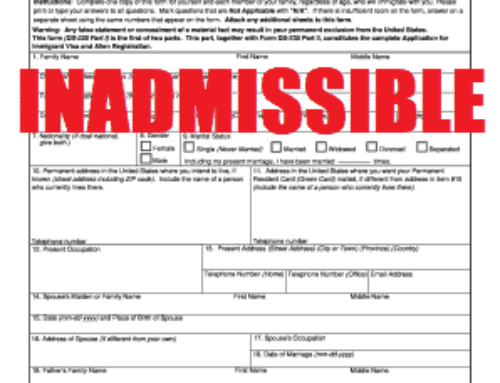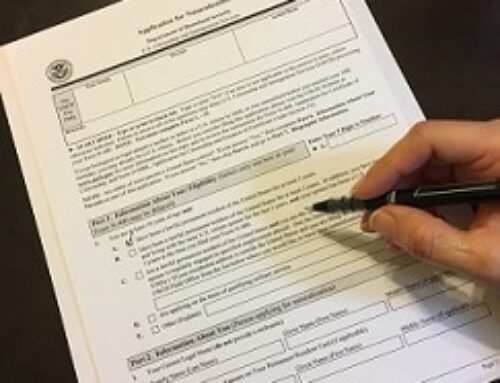Are you considering naturalization and wondering what the process entails? Understanding the requirements and tests involved is crucial to successfully navigating the path to citizenship. In this comprehensive guide, we will explore everything you need to know about naturalization tests, including the different types of tests, the potential consequences of failing, and how to prepare effectively. Whether you’re a prospective applicant or simply seeking to broaden your knowledge on the topic, this article will provide valuable insights into the naturalization process. So, let’s delve into the details and ensure you are well-equipped for this important milestone in your journey towards citizenship.
What Are Naturalization Tests?
Naturalization tests are examinations conducted by the United States Citizenship and Immigration Services (USCIS) to assess the eligibility of immigrants for acquiring United States citizenship.
The main purpose of naturalization tests is to evaluate the English language proficiency and understanding of Civics concepts, such as U.S. history and government, by applicants seeking to obtain a green card and eventual citizenship. These tests help ensure that individuals are able to communicate, engage, and assimilate into American society effectively. The testing process typically includes both written and oral components, requiring candidates to demonstrate their knowledge through interviews and examinations.
What Are the Requirements for Naturalization?
The requirements for naturalization entail specific criteria set by the USCIS, including lawful permanent residency and the submission of a citizenship application (Form N-400).
Lawful permanent residency, also known as a green card, is a mandatory prerequisite for those seeking U.S. naturalization. Applicants must have maintained continuous residence in the United States as lawful permanent residents for at least five years, or three years if married to a U.S. citizen. They must demonstrate good moral character, show attachment to the principles of the U.S. Constitution, and possess a basic understanding of the English language and U.S. civics.
Once the eligibility criteria are met, individuals can proceed with the USCIS Form N-400, the application for naturalization. This comprehensive form requests detailed personal information, employment history, travel history, and any criminal or immigration-related history. It is important to complete this form accurately and truthfully, as any discrepancies can lead to delays or even denials in the naturalization process. Applicants must undergo biometrics and attend a naturalization interview, where they will be tested on their English language proficiency and knowledge of U.S. government and history.
What Are the Different Types of Naturalization Tests?
The naturalization tests encompass two distinct examinations: the English language test and the Civics test, both of which are designed to evaluate the knowledge and proficiency of immigrants seeking citizenship.
The English language test evaluates an applicant’s ability to read, write, and speak in English. It usually includes oral and written components to assess the individual’s fluency and comprehension.
On the other hand, the Civics test focuses on the applicant’s understanding of U.S. history, government, and the rights and responsibilities of citizenship. This test covers important historical events, the Constitution, and the functioning of the government.
English Language Test
The English language test assesses the ability of immigrants to comprehend and communicate effectively in English, a crucial requirement for their integration into American society and participation in civic activities.
It serves as a measure to ensure that immigrants have the language skills necessary to engage with their communities, access education and employment opportunities, and navigate the legal and administrative processes.
The test evaluates proficiency in reading, writing, speaking, and listening, assessing a diverse range of language skills to provide a comprehensive assessment of linguistic capabilities.
Successful completion validates an individual’s readiness to fully engage in American society, fostering social cohesion and enabling meaningful contributions to the nation.
Civics Test
The Civics test evaluates immigrants’ knowledge of the United States government, history, and laws, ensuring their familiarity with the fundamental principles and values of the country.
It covers a wide array of topics, including the structure of the government, the rights and responsibilities of citizens, the history of the nation, and the democratic principles that govern the United States. The test delves into the Constitution, the Bill of Rights, the branches of government, and the electoral process. Understanding these concepts is crucial for immigrants to integrate successfully into American society and participate effectively in civic life. Possessing a solid grasp of these factors can aid in fostering a sense of allegiance and belonging to the nation they are becoming a part of.
What Happens If Someone Fails the Naturalization Tests?
Failing the naturalization tests may present various options for individuals, including the opportunity to retake the test or request an interpreter or exemption based on specific circumstances.
Individuals who do not pass the naturalization test have the chance to schedule a retake, allowing them more time to prepare for the examination. Those who require language assistance can seek an interpreter to ensure better understanding of the questions and instructions.
Individuals facing specific challenges or hardships may be eligible for an exemption from certain components of the test. This could include medical reasons or cognitive impairments that restrict the ability to comprehend and respond to the exam. Understanding these options and seeking guidance from immigration authorities is vital in navigating the process effectively.
Can Retake the Test
Individuals who fail the naturalization tests are generally afforded the chance to retake the examinations, providing them with an opportunity to address areas of difficulty and enhance their preparation.
It is essential for individuals seeking to retake the naturalization tests to carefully review the areas where they faced challenges during the initial attempt. They should consider seeking assistance from reputable study resources, instructors, or preparatory classes to strengthen their knowledge and understanding of the test content. They must ensure that they fulfill all the necessary requirements and documentation for the reapplication process, such as valid identification, proof of residency, and any specific forms mandated by the immigration authorities.
Can Request an Interpreter or Exemption
In cases of specific language or medical challenges, individuals failing the naturalization tests may request the assistance of an interpreter or seek exemptions based on compelling circumstances.
For those encountering language barriers, engaging an interpreter could greatly aid in comprehension during the naturalization process. Qualified interpreters can facilitate effective communication, ensuring that the applicant fully understands the requirements and questions posed during the tests.
Alternatively, if individuals face medical challenges or other compelling circumstances that hinder their ability to take the tests, they can seek exemptions by providing relevant medical documentation or demonstrating genuine hardship.
Can Appeal the Decision
Individuals dissatisfied with the outcome of their naturalization test results have the right to appeal the decision, enabling them to contest the assessment and present additional evidence or arguments.
The appeals process provides candidates with an opportunity to request a review of the test results through formal channels. To initiate the appeal, the applicant must typically submit a written request to the United States Citizenship and Immigration Services (USCIS) within a specified timeframe, along with any supporting documentation or explanations. Upon receipt of the appeal, the USCIS will reevaluate the test results and consider any new evidence presented. If the appeal is successful, the candidate may proceed with the naturalization process, while an unsuccessful appeal may require the individual to reapply for the naturalization test.
May Be Required to Attend a Hearing
In certain circumstances, individuals failing the naturalization tests may be summoned to attend an appeal hearing, where they can present their case and provide additional information to support their eligibility for citizenship.
During these appeal hearings, individuals have the opportunity to be represented by legal counsel, who can offer guidance and present their case before the appointed adjudicator or appeal board. It is crucial for individuals to carefully prepare for these hearings, as they play a significant role in determining the outcome of their citizenship application. The presentation of relevant evidence and legal arguments is vital to effectively petition for the reconsideration of the initial decision.
What Are the Consequences of Failing the Naturalization Tests?
Failure in the naturalization tests may lead to delays in the naturalization process, potential denial of citizenship, and additional costs and time investment to address the testing outcomes.
Delays in the naturalization process can be frustrating and may impact various aspects of an individual’s life, such as employment opportunities, travel restrictions, and rights to certain benefits. Potential denial of citizenship could result in the need to reapply, extending the timeline and further complicating the individual’s legal status. The additional costs and time investment linked to addressing testing outcomes may strain an applicant’s financial resources and cause prolonged uncertainty about their future in the country.
Delay in the Naturalization Process
Failing the naturalization tests can result in significant delays in the overall naturalization process, extending the timeline for individuals seeking to obtain citizenship status.
This delay can have a considerable impact on the individuals’ lives, affecting their ability to secure stable employment, obtain certain licenses and benefits, or even reunite with family members residing in other countries. The ramifications of test failure may also extend beyond personal consequences, affecting the overall immigration system by adding to the backlog of pending cases and straining resources. This emphasizes the importance of adequate preparation and understanding the requirements to avoid such setbacks in the naturalization journey.
Possible Denial of Citizenship
A significant consequence of failing the naturalization tests is the potential denial of citizenship, as test outcomes are integral to the decision-making process for granting citizenship status.
This denial can have various far-reaching implications, impacting an applicant’s ability to reside and work legally within the country. It may affect an individual’s access to essential benefits, such as voting rights and eligibility for certain government programs.
The test failure not only delays the attainment of citizenship but also raises concerns about the individual’s commitment to the privileges and responsibilities that come with being a citizen.
Additional Costs and Time
Individuals failing the naturalization tests may face additional financial costs and time commitments to address the testing outcomes, potentially leading to extended resource investment in pursuit of citizenship.
The financial implications of a failed naturalization test can be substantial, as candidates may have to pay for retesting, study materials, and legal assistance. In addition, the time commitment could result in delays in obtaining citizenship, with the potential for extended waiting periods and bureaucratic processes. These factors can create added stress and uncertainty for individuals seeking to become citizens, requiring them to allocate more resources and time to overcome the setbacks posed by test failure.
How Can Someone Prepare for Naturalization Tests?
Individuals can prepare for naturalization tests by utilizing study materials provided by the USCIS, engaging in practice tests, enrolling in citizenship classes, and seeking assistance from immigration attorneys.
Study materials are an essential component of the naturalization test preparation process, offering comprehensive information on civics, history, and the rights and responsibilities of U.S. citizenship. These materials can be accessed through the USCIS website or obtained from authorized sources.
Practice tests are valuable tools for assessing one’s knowledge and readiness for the actual examination.
Citizenship classes provide structured learning environments, where individuals can receive guidance from experienced instructors and interact with fellow applicants, fostering a supportive and collaborative learning experience.
Immigration attorneys can offer legal expertise and guidance, addressing any specific concerns or complexities that may arise during the naturalization process, offering invaluable support and reassurance.
Study Materials Provided by USCIS
The USCIS offers a range of study materials and resources to aid individuals in preparing for the naturalization tests, providing essential information and guidance for the citizenship application process.
These study materials include the
- USCIS website, which features a wealth of downloadable resources such as the Civics Test Study Tools, Naturalization Self-Test Study Guide, and the Reading Vocabulary Flash Cards.
- USCIS offers study booklets, audio CDs, and videos to assist test takers in understanding the examination format and content.
- The agency collaborates with community organizations and libraries to provide workshops, classes, and other educational opportunities for test preparation.
Practice Tests
Engaging in practice tests serves as a valuable preparatory tool for individuals undergoing naturalization tests, allowing them to familiarize themselves with the assessment format and refine their knowledge and skills.
By simulating the testing environment, candidates can build their confidence and develop effective time management strategies. Practice tests provide an opportunity to identify areas of weakness, enabling targeted studying to address specific areas of improvement. The exposure to a variety of question types enhances critical thinking and problem-solving abilities, which are invaluable for success on the actual test day.
Enroll in a Citizenship Class
Enrolling in a citizenship class provides individuals with structured learning and guidance, offering comprehensive preparation for naturalization tests and fostering a deeper understanding of citizenship requirements.
These classes offer a supportive environment where students can learn about the rights and responsibilities associated with citizenship, as well as the history and government of the country of interest. Participants can gain valuable insight into the interview process and improve their English language proficiency, all of which are essential components for achieving successful naturalization.
Citizenship classes often provide resources and networks that extend beyond the classroom, connecting individuals to professionals and community resources that can further their integration and acculturation. By enrolling in these classes, individuals not only receive educational support but also opportunities for personal and professional growth.
Seek Assistance from an Immigration Attorney
Obtaining legal assistance from an immigration attorney can provide individuals with tailored guidance, legal support in completing the citizenship application (Form N-400), and strategic advice in addressing naturalization test requirements.
Immigration attorneys play a crucial role in representing individuals throughout the naturalization process, ensuring all legal requirements are met. They provide comprehensive knowledge and guidance on the various aspects of the citizenship application, including eligibility criteria, required documentation, and interview preparation.
Immigration attorneys have the expertise to navigate complex legal procedures and address any potential obstacles that may arise during the naturalization test. Their application assistance can streamline the process, minimize delays, and enhance the likelihood of a successful outcome.
These attorneys offer strategic counsel to individuals, helping them understand the test format, study effectively for the civics and English language components, and prepare confidently for the interview. This guidance is invaluable in alleviating the stress and uncertainty often associated with the naturalization process.
Frequently Asked Questions
What happens if someone fails the naturalization tests?
If someone fails the naturalization tests, they will not be able to become a naturalized citizen of the United States.
What if I fail the naturalization test multiple times?
If you fail the naturalization test multiple times, you will have the opportunity to retake the test after a certain period of time. However, if you continue to fail the test, your application for naturalization may be denied.
Can I study and prepare for the naturalization tests?
Yes, you can study and prepare for the naturalization tests. There are study materials and resources available online, as well as classes and study groups that can help you prepare for the tests.
What happens if I fail the English proficiency portion of the naturalization test?
If you fail the English proficiency portion of the naturalization test, you may still have the opportunity to retake the test or request an exemption. However, if you are unable to demonstrate English proficiency, your application for naturalization may be denied.
What if I have a disability that hinders my ability to take the naturalization tests?
If you have a disability that hinders your ability to take the naturalization tests, you may request accommodations such as a sign language interpreter or a Braille version of the test. You will need to provide documentation of your disability and the accommodations needed.
What if I am denied naturalization due to failing the tests?
If you are denied naturalization due to failing the tests, you have the right to appeal the decision. You can request a hearing with an immigration officer to review your case and provide additional evidence or explanations.


